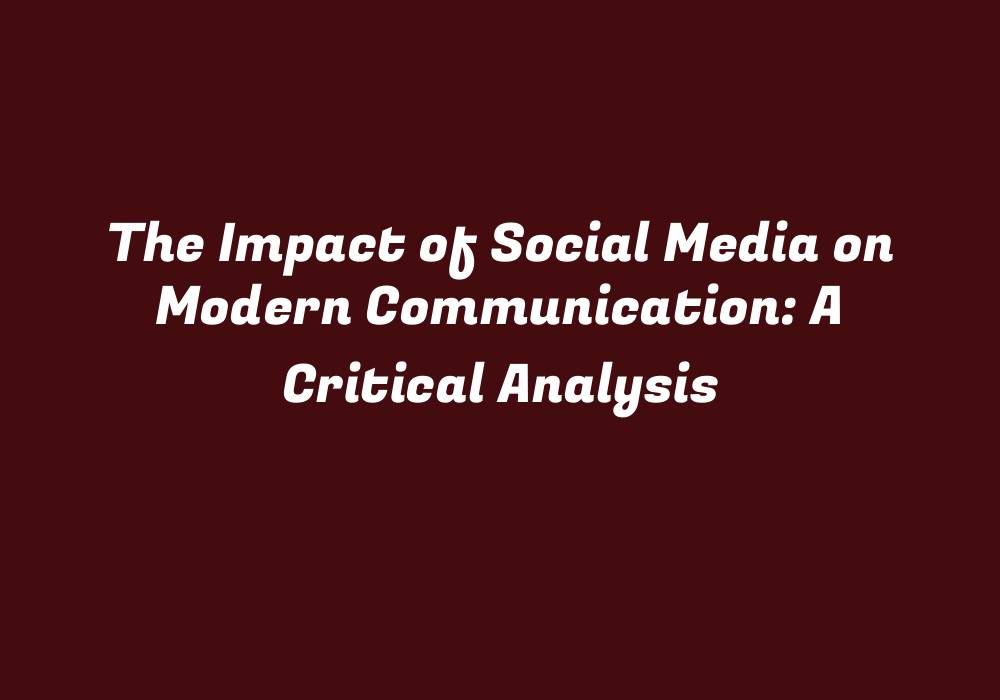The Impact of Social Media on Modern Communication: A Critical Analysis
Introduction
Communication has undergone a significant transformation in the past few years, primarily due to the advent and widespread use of social media. The impact of this technological advancement on modern communication is far-reaching and deserves our critical evaluation. This article will analyze how social media affects various aspects of human interaction, both positively and negatively.
Positive Impacts of Social Media
1. Enhanced Connections
Social media platforms have brought people closer together by facilitating communication across vast geographical distances. It enables individuals to stay connected with friends, family members, and acquaintances, which is particularly helpful for those living away from their loved ones or belonging to expatriate communities. Furthermore, it provides opportunities to foster relationships with new people sharing similar interests and experiences.
2. Empowerment of Marginalized Groups
Social media has provided a platform for marginalized groups to voice their concerns and share their unique experiences. For example, social movements such as #MeToo and Black Lives Matter have gained worldwide momentum through the use of digital platforms. These tools have empowered individuals who might have otherwise felt silenced or unheard by traditional media outlets.
3. Information Accessibility
Social media has made information dissemination faster, easier, and more accessible than ever before. This has contributed to increased awareness about various issues such as global events, environmental concerns, and social justice movements. By sharing news content and personal experiences, users can create a greater public consciousness about crucial topics.
4. Business Opportunities
Social media has created numerous opportunities for businesses and entrepreneurs alike. It provides an affordable platform for advertising, customer engagement, and market research. Small business owners, in particular, can leverage social media to reach larger audiences and expand their consumer base. Additionally, it promotes e-commerce by connecting buyers with sellers across the globe.
5. Enhanced Creativity and Expression
Social media fosters creativity through the sharing of visual, written, and audio content. This encourages individuals to express themselves in various forms, including art, music, photography, and writing, which can contribute positively to their mental well-being and personal growth. Furthermore, it gives people a creative outlet that was previously unavailable or limited by geographical location.
Negative Impacts of Social Media
1. Digital Divide
The digital divide refers to the disparity in access to technology and information between socio-economic groups. This issue is exacerbated by social media as it requires a certain level of digital literacy and access to devices, the internet, or both. As a result, individuals with limited resources or technological knowledge may feel excluded from the social media landscape.
2. Cyberbullying and Online Harassment
The anonymity that social media provides has led to increased instances of cyberbullying and online harassment. This can cause significant emotional distress for the victims and often results in long-lasting effects on their mental well-being. In some cases, it may even lead to self-harm or suicide. The prevalence of such incidents highlights the need for stricter content moderation policies within social media platforms.
3. Time Consumption and Addiction
Social media’s constant stream of updates and notifications can be addictive and negatively impact users’ productivity, relationships, and mental health. Frequently checking one’s devices for updates can lead to distraction and an inability to concentrate on important tasks or engage fully with their surroundings. Furthermore, the constant search for validation through “likes” or comments may contribute to feelings of inadequacy and low self-esteem.
4. Misinformation and Manipulation
Social media has facilitated the spread of misinformation, propaganda, and manipulative content, which can affect public opinion on various issues. The speed at which information travels online allows for the dissemination of false or biased content without proper verification or context. This can result in individuals being exposed to information that is either untrue or intentionally designed to influence their beliefs.
5. Privacy Concerns and Surveillance
The vast amount of personal data shared on social media platforms raises concerns about privacy breaches, identity theft, and surveillance by various entities. Users might be unaware of how their information is being collected, stored, or used by companies or governments. This lack of transparency can lead to a loss of trust in digital communication platforms.
Conclusion
Social media has significantly transformed the landscape of modern communication in both positive and negative ways. While it offers countless opportunities for connection, expression, and information sharing, it also presents challenges such as the digital divide, cyberbullying, time consumption, misinformation, and privacy concerns. It is essential to balance the benefits and drawbacks of social media by acknowledging its potential impact on various aspects of our lives and taking steps to protect ourselves from its negative effects.
